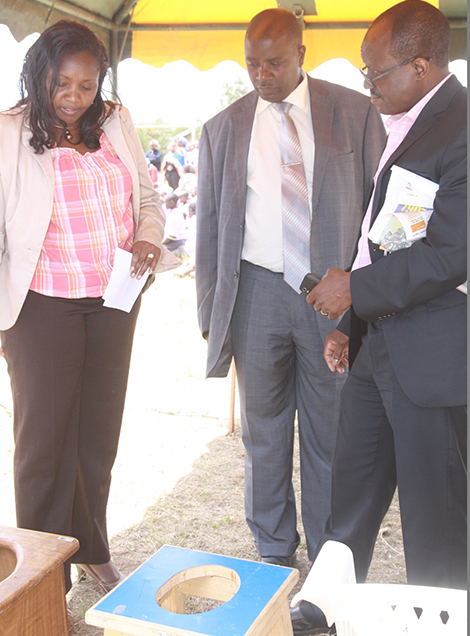 |
|
Nakuru County director of health Dr Benedict Osore with county public health officer Samuel King’ori and USAids Wash plus project manager Evelyn Makena examine some chairs used for defecation for the disabled at Longonot village in Naivasha. He said that around 300 of the 1,949 villages in the county had been declared open defecation free. [PHOTO: ANTONY GITONGA/STANDARD] |
NAKURU COUNTY: The ministry of health has expressed its concern over the high number of people who defecate in the open mainly along the main highways in the country.
Following the revelation, Nakuru County has announced plans in major centres along the Nairobi-Nakuru and Naivasha-Mai Mahiu road to construct public toilets.
According to the department of health, the open defecation was one of the leading causes in the increase in the number of typhoid and diarrhoea cases in the county.
This emerged during celebrations in Longonot Primary school in Naivasha where Longonot was declared as the first Open Defecation Free (ODF) village in Nakuru County.
According to Nakuru County director of health Dr Benedict Osore, open defecation on the highways was a major problem which needed to be addressed urgently.
He said that the county in conjunction with other partners was planning to construct public toilets along the highway which would come in handy for motorists and passengers.
“The centres will also offer other services like HIV testing and counselling and the public toilets will help deal in containing cases of diarrhoea and typhoid,” he said.
He said that the county was committed to eradicating communicable diseases in the next five years and was working on how to dispose pampers which had turned out to be public nuisance.
On his part, Nakuru county public health officer Samuel King’ori said that around 300 of the 1,949 villages in the county had been declared open defecation free.
King’ori said the campaign aimed at sensitizing residents on proper hygiene and had seen the number of sanitation related diseases drop significantly.
“So far we have trained 235 public health officers who are tasked with training residents on the use of sanitation as one way of eradication communicable diseases,” he said.
“Through ODF we have been able to reduce diarrhoea and typhoid cases by 75 percent and we seek to have them eliminated in the county,” said King’ori.
The campaign which is targeting various villages in the county as one way of reducing disease burden has been funded by USAID Washplus and FHI360.
During the celebrations a natural leader Pauline Nduta expressed her concern over the number of passengers defecating along the highways while traveling to their destinations.
Nduta said they had formed a group of villagers who were monitoring the situation and sensitizing the passengers on the need to use latrines instead of defecating in the open.
Stay informed. Subscribe to our newsletter
“We have seen a drop in the number of typhoid cases amongst our school going children thanks to this campaign against open defecation,” she said.
 The Standard Group Plc is a
multi-media organization with investments in media platforms spanning newspaper
print operations, television, radio broadcasting, digital and online services. The
Standard Group is recognized as a leading multi-media house in Kenya with a key
influence in matters of national and international interest.
The Standard Group Plc is a
multi-media organization with investments in media platforms spanning newspaper
print operations, television, radio broadcasting, digital and online services. The
Standard Group is recognized as a leading multi-media house in Kenya with a key
influence in matters of national and international interest.
 The Standard Group Plc is a
multi-media organization with investments in media platforms spanning newspaper
print operations, television, radio broadcasting, digital and online services. The
Standard Group is recognized as a leading multi-media house in Kenya with a key
influence in matters of national and international interest.
The Standard Group Plc is a
multi-media organization with investments in media platforms spanning newspaper
print operations, television, radio broadcasting, digital and online services. The
Standard Group is recognized as a leading multi-media house in Kenya with a key
influence in matters of national and international interest.









